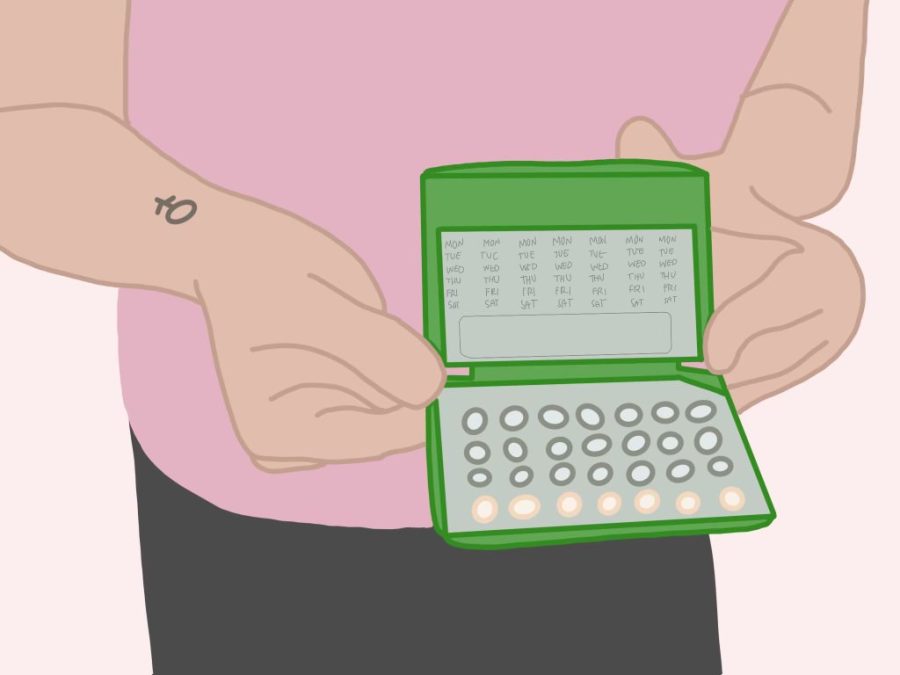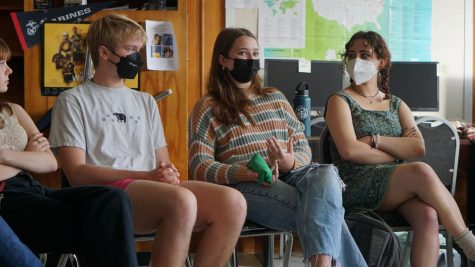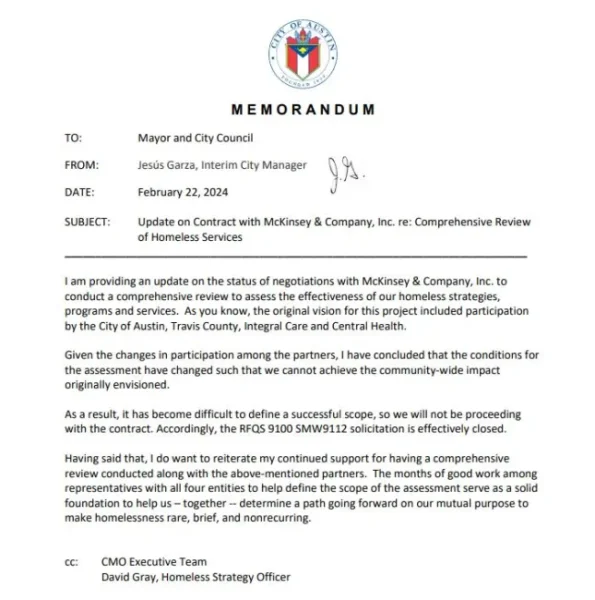Texas teens face barriers following court ruling requiring parental consent to obtain birth control
Federal judge rules Title X violates parental rights
The Title X program long enabled teens to access free contraception confidentially regardless of age, income and citizenship through such clinics since 1970. However, U.S. District Judge Matthew Kacsmaryk ruled in late December that Title X violates parental rights, preventing teens from obtaining birth control without explicit parental consent.
February 23, 2023
Since 1970, Texas teens have held the right to obtain birth control without parental consent. Due to a recent change in healthcare policy, however, that’s no longer the case.
We hope that as the case proceeds, we are able to revoke this guidance and continue to provide minors in Texas the sexual and reproductive care they need and deserve with or without parental consent,
— Stephanie LeBleu, Title X project director at Every Body Texas
Senior Rachel Nabhan, co-president of Mac Feminism Club, marks this as an era of encroachment on personal autonomy as well as a concerning implication for the future of Texas teens.
“I feel like we should still be able to get our own birth control because we know what’s best for our own bodies and some parents are very restricting in that way, and it can just harm the general public of teens,” she said.
For Nabhan, birth control allows her to have more regular periods, one of the many health benefits of oral contraceptives.
“I just have really irregular periods, so birth control gives me a consistent schedule so I know when it’s coming,” she said. “It’s healthy and I don’t feel ashamed.”
The health benefit of birth control is one of many concerns teens have had following the court ruling on Dec. 20, establishing required parental consent for Texas teens to obtain birth control from federally funded healthcare clinics.
The Title X program has long enabled teens to access free contraception confidentially regardless of age, income and citizenship through such clinics for over 50 years. U.S. District Judge Matthew Kacsmaryk ruled in late December that Title X violates parental rights guaranteed by the 14th Amendment.
The case was brought to Kacsmaryk’s court by plaintiff Jonathan Mitchell, representing Alexander Deanda who seeks to raise his daughters “in accordance with Christian teaching on matters of sexuality, which requires unmarried children to practice abstinence and refrain from sexual intercourse until marriage” making Deanda against the provision of birth control without parental knowledge.
In his official opinion on the case Kacsmaryk wrote, “Texas law confers Plaintiff the right to consent to his children’s medical care and general standing to file suit for a violation of that right.”
Following the court order, Every Body Texas, the statewide administrator of the Title X program, was forced to ask all of its over 150 clinics to implement this new restriction.
“We hope that as the case proceeds, we are able to revoke this guidance and continue to provide minors in Texas the sexual and reproductive care they need and deserve with or without parental consent,” Stephanie LeBleu, Title X project director at Every Body Texas, told The Texas Tribune.
Despite this ruling, Texas clinics will continue to offer teens STI testing, pregnancy tests, condoms and emergency contraceptives without parental consent.

In response to the court decision, Planned Parenthood released the following statement stressing the importance of Title X to the Texas community.
“Title X is a vital healthcare resource for birth control, annual wellness exams, sexually transmitted infection testing and treatment, UTI treatment, breast and cervical cancer screening and other essential sexual healthcare, especially for Texans without healthcare insurance. Healthcare services funded by Title X are available today despite the new ruling that teens seeking contraception are required to obtain parental consent even if they are parents themselves. This ruling is devastating barrier for vulnerable teens seeking to prevent an unintended pregnancy. Texans need access to birth control not roadblocks.”
Women’s studies teacher Mitra Darakhshandeh believes that limited access to birth control presents a barrier to essential resources for her students.
“This will mainly punish young women who are trying to make choices over their bodily autonomy and sexuality,” Darakhshandeh said. “While it would be ideal for parents and guardians to be involved and aware of these choices, not all teenagers feel that they can safely share that information. I’d rather a teen have the resources to make safer choices independently, than no choice at all.”
This ruling is devastating barrier for vulnerable teens seeking to prevent an unintended pregnancy. Texans need access to birth control not roadblocks.
— Planned Parenthood said in a statement
For senior Sabina Guardado, this legislation threatens to harm her surrounding community.
“It’s just another example of birth control kind of being stripped away and people not realizing no matter what people are going to have sex, and it doesn’t matter if you teach abstinence,” she said. “It’s just going to result in more unwanted pregnancies.”
As Texas holds the most extreme abortion ban in the nation, Darakhshandeh believes further barriers to contraceptives like this one compounded with other limitations on reproductive healthcare will inevitably lead to an increase in teen pregnancies.
“Young women in Texas are being denied a plurality of choice regarding their future, and I think that’s going to come with consequences,” she said.
Darakhshandeh feels that the state’s legislation relies on unrealistic expectations, expectations that encroach on the futures of young women in Texas.
“The entire debate around abortion has always required an idealism that denies the humanity of women in so many ways,” she said. “These blanket policies, from the six abortion bans in Texas, or the restriction of access to birth control, have too many alternative cases where denying those rights would endanger women.”
Guardado feels this decision has overlooked the multi-faceted uses of oral contraceptives, leaving many teens without access to medication that addresses other health issues.
“People who use birth control for other reasons like [menstrual] cramps are going to continue to suffer because they can’t get birth control even though it may have nothing to do about how sexually active they are,” she said. “If the goal for people who don’t want birth control to be available is to not promote sex they’re clearly not understanding the situation has more angles than just being about pregnancy.”
As a health student, senior Helena Finos feels that this newly implemented restriction is an attempt to push Texas’ abstinence-only curriculum onto teens.
I’d rather a teen have the resources to make safer choices independently, than no choice at all,
— women's studies teacher Mitra Darakhshandeh
According to the Texas education code, health curriculum is required to present abstinence as the “preferred choice of behavior in relationship to all sexual activity for unmarried persons of school age” as well as “devote more attention to abstinence from sexual activity.”
Finos fears the emphasis on abstinence in the Texas health curriculum limits teens’ knowledge of safe sex practices and instead creates shame around sexuality.
“Since there’s a lot of stigmas and fear around [sex], they think there will be a decrease in sexual activity but instead it’s just a decrease in the safety and protection of teens against pregnancy and sexually transmitted diseases and infections, so it doesn’t keep them safe it just takes away their resources,” she said.
Darakhshandeh worries that this inaccessibility will lead to an intolerant environment where teens seek unsafe solutions in Texas.
“It’s inevitable that I will have some students who will be directly affected by the policy,” she said. “Overall, though, I think what’s going to have the biggest effect is the messaging it’s going to send. It’s going to tell my students that they are not allowed to use their own discretion to make decisions concerning their health. And that’s sad.”
We should still be able to get our own birth control because we know what’s best for our own bodies.
— senior Rachel Nabhan
She hopes her class will continue to be a safe place for students to question and challenge these new restrictions.
“While I have my own personal opinions, as a teacher, I really hope to at least give my students a space to question what is going on here,” Darakhshandeh said. “The fear of women and their sexuality is a very real thing, and these laws are purposefully targeting that. I hope that students will use women’s studies as a safe space to question and explore the motives behind laws like this.”
Darakhshandeh hopes that the institution of this decision will encourage her students to speak out and address their concerns, spurring action within the Texas community.
“Best case scenario is that it will encourage young Texans who disagree to start harnessing their political voices, speak up for their rights, and communicate the true consequences of these kinds of policies,” she said.



















![With the AISD rank and GPA discrepancies, some students had significant changes to their stats. College and career counselor Camille Nix worked with students to appeal their college decisions if they got rejected from schools depending on their previous stats before getting updated. Students worked with Nix to update schools on their new stats in order to fully get their appropriate decisions. “Those who already were accepted [won’t be affected], but it could factor in if a student appeals their initial decision,” Principal Andy Baxa said.](https://macshieldonline.com/wp-content/uploads/2024/04/53674616658_18d367e00f_o-600x338.jpg)



sofia • May 2, 2023 at 10:23 pm
I really really like this story because this story is addressing how us teens can and will make our own choice because like senior Rachel Nabhan said “we should still be able to get our own birth control because we know what’s best for our own bodies.” We have a choice, I also like that this article is not only talking about the issues, we need access to birth control but there are multiple examples and sites to look at. Thank you for your support and letting young women that they are not alone.